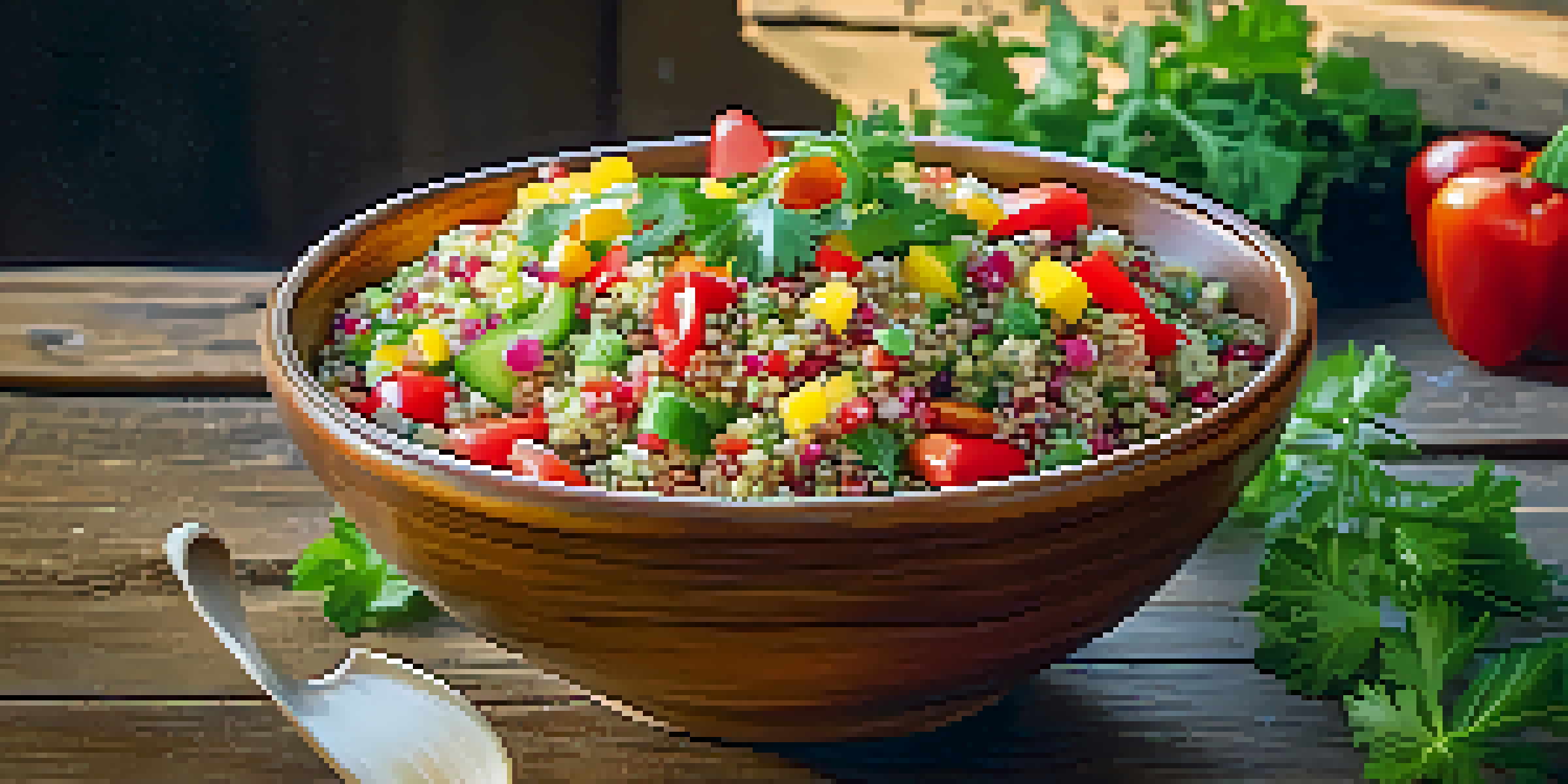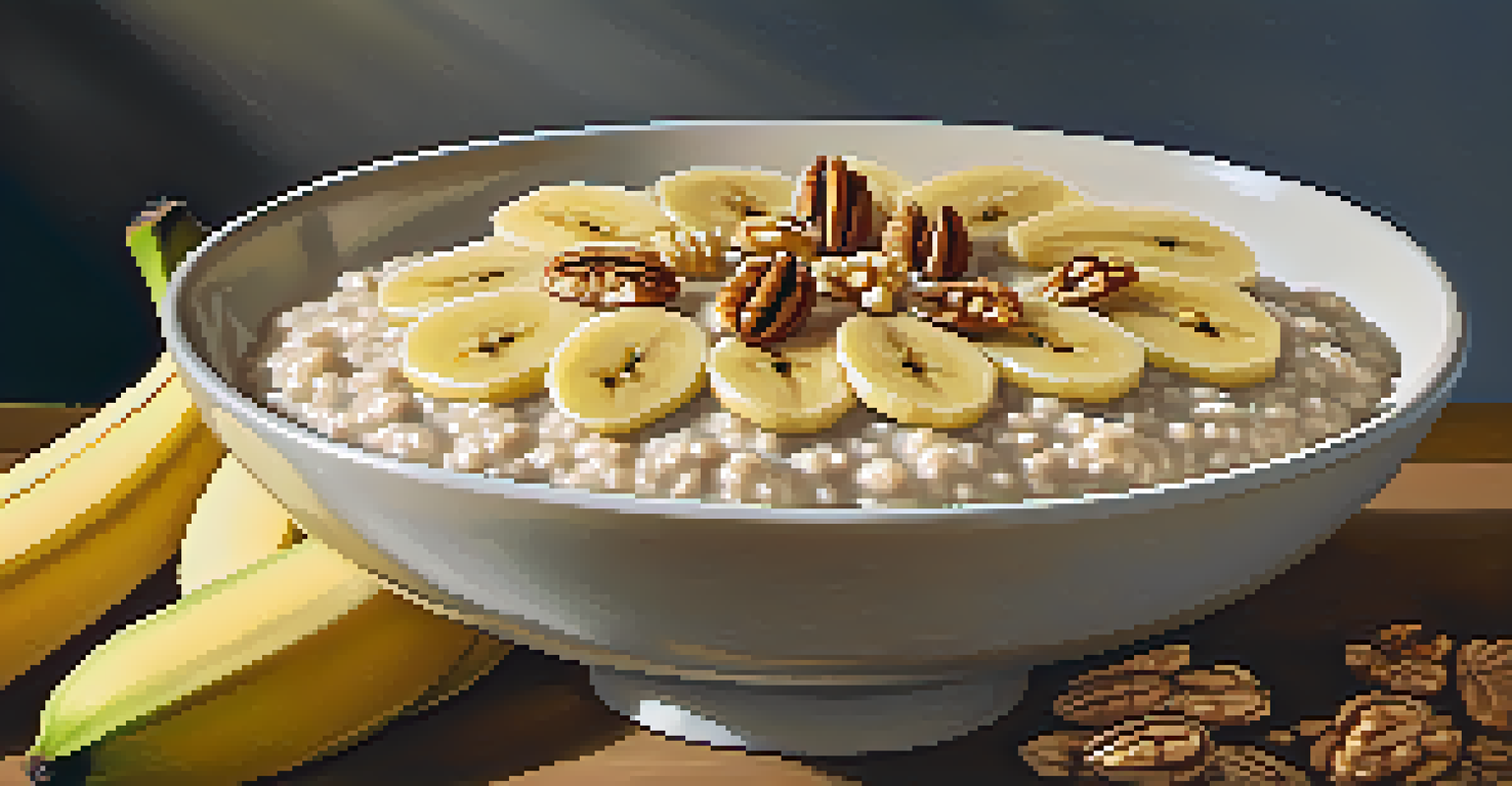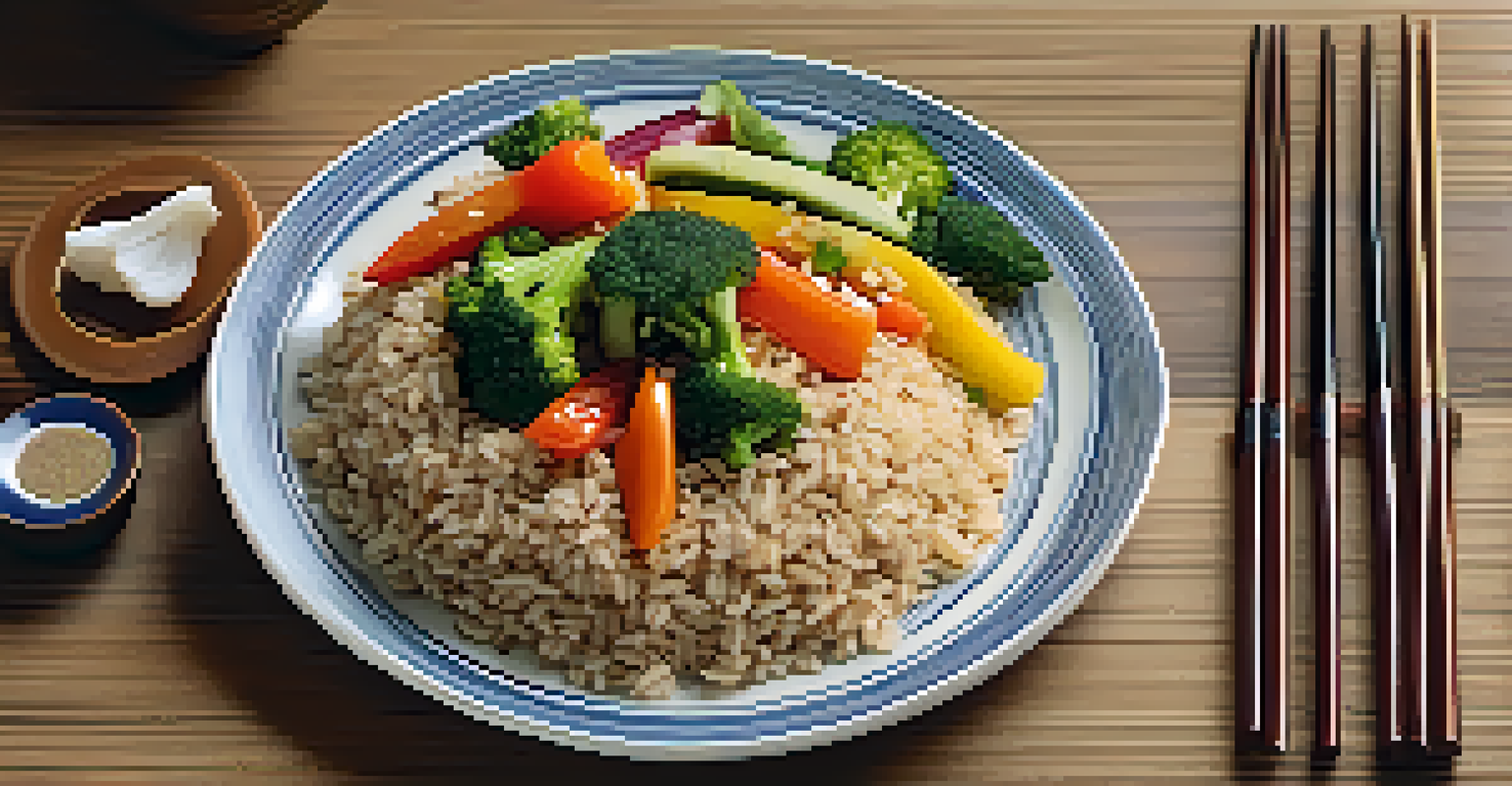Essential Grains for a Balanced Vegetarian Diet: A Guide

Understanding the Role of Grains in a Vegetarian Diet
Grains are a cornerstone of vegetarian diets, providing essential nutrients and energy. They offer a rich source of carbohydrates, which are crucial for fueling our daily activities. Additionally, grains contribute dietary fiber, which aids digestion and helps maintain a healthy weight.
Let food be thy medicine and medicine be thy food.
Incorporating a variety of grains into your meals not only adds flavor but also ensures you receive a broad spectrum of vitamins and minerals. Whole grains, in particular, are packed with nutrients like B vitamins, iron, and magnesium. These nutrients play vital roles in energy production and overall well-being.
Ultimately, understanding the importance of grains can help you create balanced meals that support your health goals. By choosing a diverse range of grains, you can enjoy a fulfilling vegetarian diet that meets your nutritional needs.
Quinoa: The Complete Protein Powerhouse
Quinoa is often hailed as a super grain, and for good reason. Unlike many other grains, quinoa is a complete protein, meaning it contains all nine essential amino acids necessary for our body. This makes it an excellent choice for vegetarians looking to meet their protein requirements.

Beyond protein, quinoa is also rich in fiber and various vitamins and minerals. It boasts a low glycemic index, which can help regulate blood sugar levels, making it a smart choice for those watching their sugar intake. Plus, its nutty flavor and fluffy texture make it a versatile ingredient in salads, bowls, or as a side dish.
Grains: Essential for Vegetarian Diets
Grains provide vital nutrients and energy, making them a cornerstone of a balanced vegetarian diet.
Incorporating quinoa into your meals can elevate your vegetarian diet, providing both nutrition and satisfaction. Whether you use it as a base for a hearty salad or as a filling for stuffed peppers, quinoa is a delicious way to enhance your grain intake.
Brown Rice: A Staple for Sustained Energy
Brown rice is a classic staple in many vegetarian diets, and it's easy to see why. As a whole grain, it retains its bran and germ, making it richer in nutrients compared to white rice. This means more fiber, which can aid digestion and keep you feeling full longer.
You are what you eat.
Additionally, brown rice is a good source of complex carbohydrates, providing sustained energy throughout the day. It’s also packed with essential minerals like selenium, which plays a role in metabolism and helps protect cells from damage. This makes brown rice a smart choice for anyone looking to maintain energy levels.
Whether you serve it alongside a stir-fry, mix it into soups, or use it as a base for grain bowls, brown rice is both versatile and nourishing. Embracing it as a staple in your pantry can help support a balanced vegetarian diet.
Oats: A Breakfast Champion for Everyone
Oats have gained popularity as a breakfast staple, and for good reason. They're not only hearty and satisfying but also packed with nutrients. Rich in beta-glucans, a type of soluble fiber, oats can help lower cholesterol and improve heart health.
Starting your day with oats provides a steady release of energy, keeping you full and focused throughout the morning. They are incredibly versatile, too—enjoy them as oatmeal, in smoothies, or even in baked goods like granola bars. This flexibility makes them an easy addition to any meal plan.
Quinoa: A Complete Protein Source
Quinoa stands out as a complete protein, offering all essential amino acids and numerous health benefits.
Incorporating oats into your vegetarian diet can enhance your overall nutrition while offering a delicious start to your day. With endless topping options, from fruits to nuts, you can easily customize oats to suit your taste.
Barley: The Fiber-Rich Grain for Gut Health
Barley is often overlooked, but it's a grain worth adding to your vegetarian diet. Packed with fiber, especially soluble fiber, barley can support gut health and promote regularity. This fiber helps feed the good bacteria in your gut, which is essential for overall digestive health.
In addition to its fiber content, barley is rich in antioxidants and vitamins, making it a nutritious choice. It has a chewy texture and a slightly nutty flavor, which can elevate soups, salads, and grain bowls. Plus, it’s low in calories, making it a smart option for those watching their weight.
By incorporating barley into your meals, you can enjoy its health benefits while adding variety to your diet. Whether you use it in a hearty stew or as a base for a warm grain salad, barley can be a delightful addition.
Millet: The Ancient Grain with Modern Appeal
Millet is an ancient grain that has made a comeback in modern kitchens. It's naturally gluten-free, making it an excellent option for those with gluten sensitivities. Millet is also high in magnesium and phosphorus, which are important for bone health and energy production.
This versatile grain has a mild flavor that can easily absorb the taste of other ingredients, making it a great base for various dishes. You can use it in porridge, salads, or even as a stuffing for vegetables. Its adaptability makes millet a valuable addition to any vegetarian diet.
Variety of Grains Enhances Nutrition
Incorporating a diverse range of grains not only adds flavor but also ensures a broad spectrum of nutrients.
As you explore different grains, don't overlook millet. Its nutritional benefits and culinary flexibility can bring new life to your meals while supporting a balanced vegetarian lifestyle.
Farro: The Nutty Grain for a Wholesome Meal
Farro is an ancient grain that offers a unique flavor and texture, making it a delightful addition to your vegetarian diet. With its chewy consistency and nutty taste, farro can elevate salads, soups, and grain bowls, providing a hearty component to any dish. It's also a great source of protein and fiber.
In addition to its taste, farro is rich in essential nutrients like iron, magnesium, and B vitamins. These nutrients support energy production and overall health, making farro a smart choice for fueling your body. Plus, it's relatively easy to prepare—just boil it like pasta until tender.

Incorporating farro into your meals not only enhances flavor but also boosts the nutritional content. Whether you mix it with roasted vegetables or use it as a side dish, farro is a wholesome grain that supports a balanced vegetarian diet.
Choosing and Preparing Grains for Your Diet
When it comes to incorporating grains into your vegetarian diet, variety is key. Aim to include a mix of whole grains to ensure you get a range of nutrients. Consider your cooking methods, as some grains may require soaking or longer cooking times, while others can be prepared quickly.
Experimenting with different grains can also keep your meals exciting. Try swapping out rice for quinoa or barley in your favorite recipes to add new textures and flavors. Additionally, you can find pre-cooked options for convenience without sacrificing nutrition.
Finally, remember that grains can be paired with various proteins and vegetables to create balanced meals. By being mindful of your grain choices and preparation methods, you can enhance your vegetarian diet and enjoy the many benefits these essential foods have to offer.